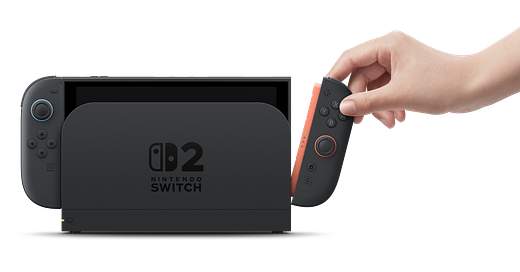Video game industry group expects Trump tariffs to have dire effects
The ESA tells Game File: "Any one product that a consumer would buy is likely to be subject to many of the tariffs announced, all compounded on top of one another."
The Entertainment Software Association, the U.S. trade group that reps all major gaming companies, including Nintendo, Microsoft and Sony, says President Donald Trump's recently announced tariffs "are going to have a real and detrimental impact on the video game industry."
Trump announced steep tariffs on dozens of countries yesterday, continuing his current administration’s efforts to smash things and see what holds together.
ESA senior vice president Aubrey Quinn tells Game File that gaming hardware, including consoles, are likely to take a bit hit due to the new levies. These machines are made in some of the countries hit with big tariffs yesterday. Beyond that, their parts are sourced from multiple countries, and the devices often cross into the U.S. multiple times as they are made and prepped for retail.
“Any one product that a consumer would buy is likely to be subject to many of the tariffs announced, all compounded on top of one another."
The new Trump tariffs were announced yesterday and include a 46% levy on Vietnam, and 34% (or 54%?) on goods from China, among other countries where gaming hardware is made. Nintendo, which in recent years moved much of its console manufacturing to Vietnam, announced the launch price of the Switch 2 yesterday at $450 U.S., a price increase over the Switch 1’s launch cost, even when adjusted for inflation. In Japan, where the system isn’t subject to U.S. tariffs, a Japanese-language-only version of the system, locked to users who designate their accounts as being based in Japan, will sell for the equivalent of $343. (Nintendo has avoided saying whether the higher price for the U.S. market was tied to their expectations around tariffs).
Update - April 11: 4:52pm: Changed the reference of how much Switch 2 production is located in Vietnam, as previous phrasing implied the majority. The amount is unknown. Bloomberg recently reported that a third of Switch 2s are now made in Vietnam, as Nintendo shifted production from China.
The ESA, like others, believes this tariff story is far from over, with the risk of retaliatory tariffs looming.
"I think what we heard yesterday is not the end of the story, not for the United States, not for other countries," Quinn said.
Asked whether the Trump administration had a point that more goods simply should be made in the U.S. and whether the ESA's members should consider that option, Quinn said, "I think every company, every industry, the video game industry included, needs to think about what’s best for consumers, best for business, and best for employees. Supply chains are complicated and, certainly, supply chains don’t change overnight. Everything that is considered or decided can’t be a quick turnaround and can’t be a knee-jerk reaction to any particular announcement”
Last week, the ESA joined other other tech trade groups, in asking the U.S. trade representative Jamieson Greer to avoid new tariffs and “increase the use of existing trade tools that strengthen trade relations with key markets for U.S. products and services.”
The ESA also had asked to meet with Greer, but has not done so yet.
The ESA, Quinn said, is nevertheless “optimistic that there will be a solution that doesn’t damage U.S. industries, ours included, and doesn’t hurt U.S. consumers.”
In related news, the stock market is tanking today.






What an end line
It's hard to imagine that the higher prices we're seeing from Nintendo have nothing to do with the tariffs and the lack of transparency of what the tariffs were going to be. So in the end, the consumers pay the price. I struggle to blame Nintendo, they were probably hoping for some clarity to make a good decision, but they had to be defensive with their pricing.